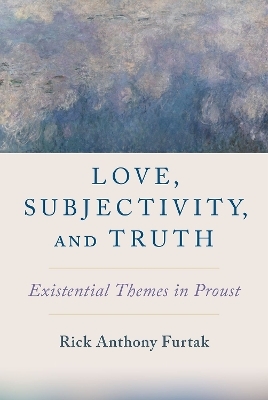
Love, Subjectivity, and Truth
Existential Themes in Proust
Seiten
2023
Oxford University Press Inc (Verlag)
978-0-19-763372-4 (ISBN)
Oxford University Press Inc (Verlag)
978-0-19-763372-4 (ISBN)
Love, Subjectivity, and Truth interprets Marcel Proust's masterpiece as an inquiry into love and the meaning of life, especially the question of whether love can be trusted or ought to be transcended. Drawing upon both the existential tradition and the ancient arguments for skepticism, it displays and evaluates what In Search of Lost Time can show us about how to navigate our emotional lives.
Love, Subjectivity, and Truth engages in a lively manner with the overlapping areas of philosophy and literature, philosophy of emotions, and existential thought. “Subjective truth,” a phrase used in Proust's novel In Search of Lost Time, is rich with existential connotations. It invokes Kierkegaard above all, but significantly Nietzsche as well, and other philosophers who thematize love, subjectivity, and truth. In Search of Lost Time is especially concerned about what we can know about others through love. Insofar as it conveys and analyzes experience, the novel is capable not only of exploring existential issues but also of doing something like phenomenology.
What we know is shaped by our way of knowing, just as the properties of visible, colored objects are determined by the wavelengths of light our eyes can see. Nowhere does the subjective basis of our awareness appear so evident as it does when we view things through loving eyes. In Proust's novel we find skeptical views about love expressed again and again. However, we also note countercurrents, in which love is shown to provide a unique sort of insight. At those times, love seems to be a prerequisite of veridical apprehension. Love, Subjectivity, and Truth investigates this tension as it is played out in Proust's fiction.
Love, Subjectivity, and Truth engages in a lively manner with the overlapping areas of philosophy and literature, philosophy of emotions, and existential thought. “Subjective truth,” a phrase used in Proust's novel In Search of Lost Time, is rich with existential connotations. It invokes Kierkegaard above all, but significantly Nietzsche as well, and other philosophers who thematize love, subjectivity, and truth. In Search of Lost Time is especially concerned about what we can know about others through love. Insofar as it conveys and analyzes experience, the novel is capable not only of exploring existential issues but also of doing something like phenomenology.
What we know is shaped by our way of knowing, just as the properties of visible, colored objects are determined by the wavelengths of light our eyes can see. Nowhere does the subjective basis of our awareness appear so evident as it does when we view things through loving eyes. In Proust's novel we find skeptical views about love expressed again and again. However, we also note countercurrents, in which love is shown to provide a unique sort of insight. At those times, love seems to be a prerequisite of veridical apprehension. Love, Subjectivity, and Truth investigates this tension as it is played out in Proust's fiction.
Rick Anthony Furtak is Associate Professor of Philosophy at Colorado College. His work is focused on the moral psychology of the emotions, the relations between philosophy and literature, and the unique spirit of existential thought. He is past President of the Søren Kierkegaard Society. His translations from Rainer Maria Rilke and a book of his own poems are among his most recent publications.
Preface
1. Love and the Meaning of Life
2. On Possibility and Significance
3. Skepticism and Perspective: The Elusiveness of Truth
4. On Loving Badly and Discovering Truth Nonetheless
5.
| Erscheinungsdatum | 03.06.2023 |
|---|---|
| Verlagsort | New York |
| Sprache | englisch |
| Maße | 212 x 149 mm |
| Gewicht | 304 g |
| Themenwelt | Geisteswissenschaften ► Philosophie ► Ethik |
| Geisteswissenschaften ► Sprach- / Literaturwissenschaft ► Anglistik / Amerikanistik | |
| Geisteswissenschaften ► Sprach- / Literaturwissenschaft ► Literaturwissenschaft | |
| ISBN-10 | 0-19-763372-2 / 0197633722 |
| ISBN-13 | 978-0-19-763372-4 / 9780197633724 |
| Zustand | Neuware |
| Informationen gemäß Produktsicherheitsverordnung (GPSR) | |
| Haben Sie eine Frage zum Produkt? |
Mehr entdecken
aus dem Bereich
aus dem Bereich


